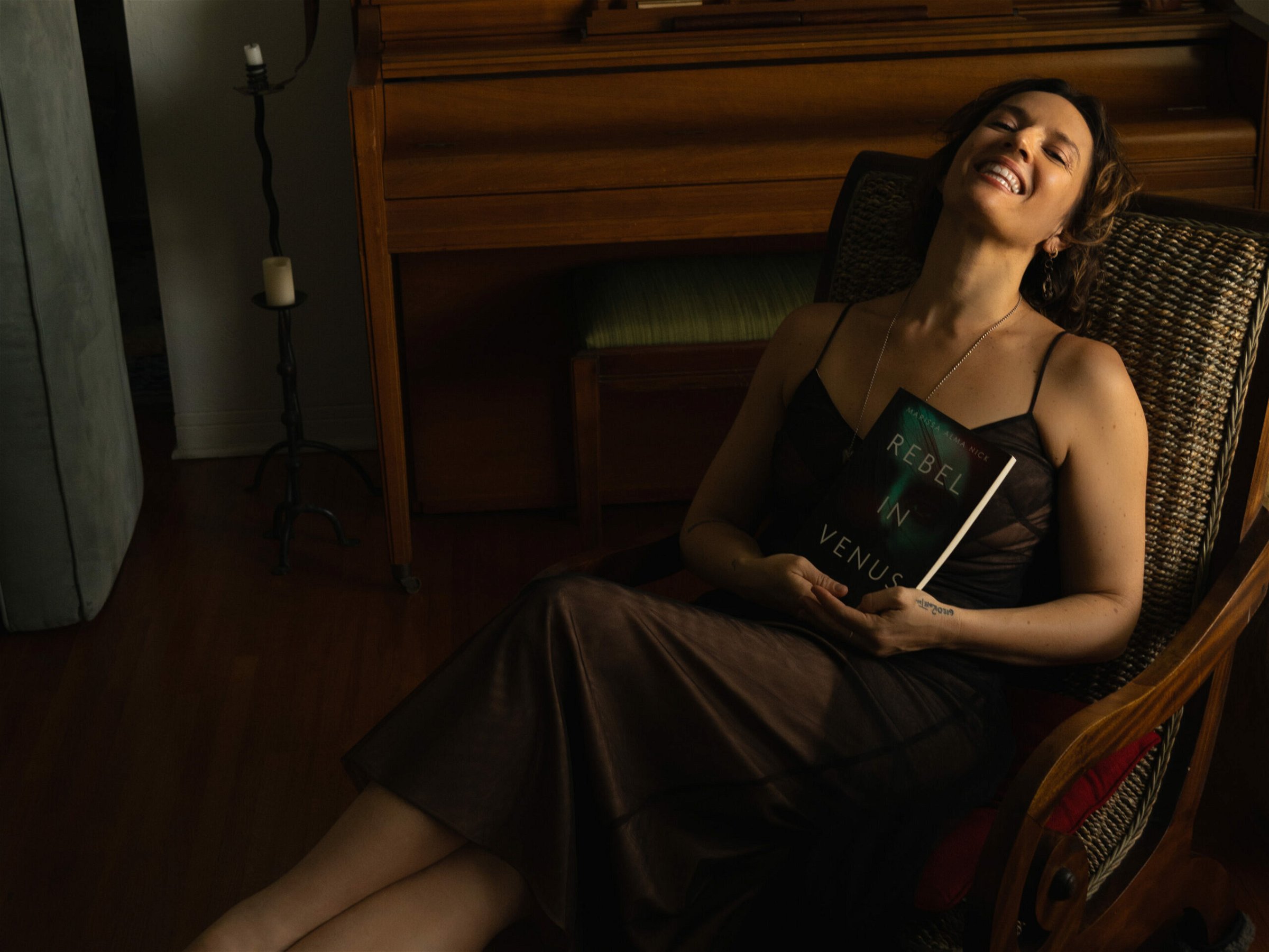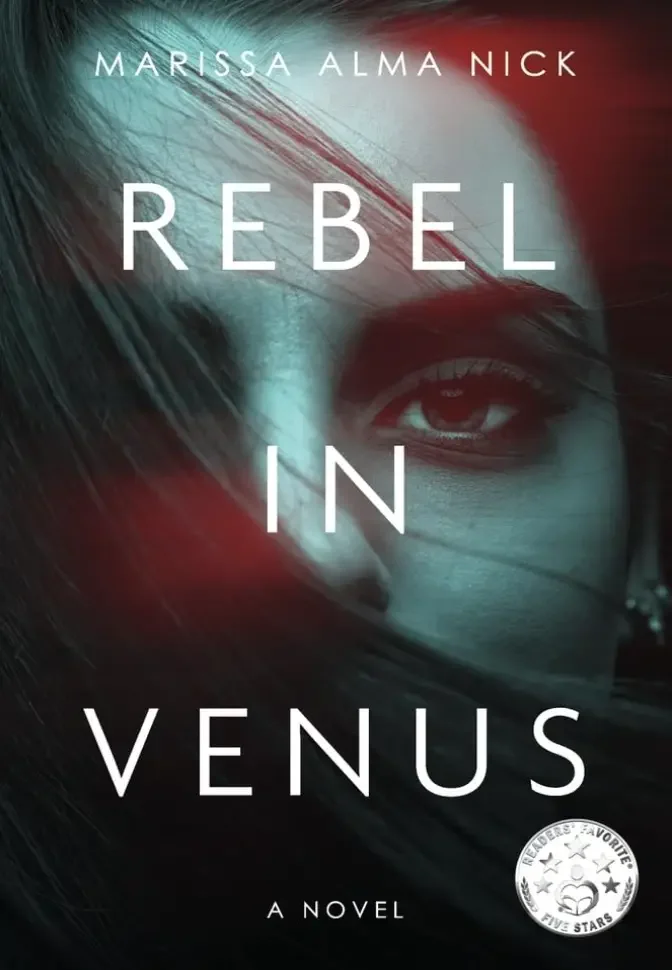Meet Marissa Alma Nick, the inspiring queer author who recently released her debut novel dubbed Rebel in Venus. Rebel in Venus is the story of a queer woman who suffered sexual assault, heartbreak, abuse, and suicidal thoughts leading her to the point of despair, only to find hope through the sheer resilience of her will and newfound friendship.

Rebel in Venus is a semi-autobiographical powerful, and honest story of redemption that illuminates human experiences with an authentic perspective on some of today’s most pressing social issues such as mental health, trauma, abuse, and suicide. The book brilliantly de-stigmatizes and demystifies mental health – a subject that has historically been considered shameful and taboo – not only for queer women but as well for all women. Marissa started her own dance-theatre company Alma Dance Theater in Miami in 2012, and became the founding artistic director for the festival: ScreenDance Miami. While in Miami she’s been an adjunct professor for the University of Miami’s Musical Theater Department and has
produced, choreographed, and directed live shows for Art Basel Miami, Faena Miami, Tigertail
Productions, Vizcaya Museum, Perez Art Museum, Showfields Miami, and Together Arts.
After four knee surgeries, and the tragic suicide of her best friend in January 2020, followed by the worldwide isolation brought upon by Covid 19, Marissa found herself forced by life to sit down and write this book. It became urgent for her to share and speak out about her experiences with mental health and abuse not only as a Cuban Jewish woman and a queer woman but also as a dancer. According to Marrissa, dancers are experts at masking physical pain, and sadly they are also adept at disguising mental anguish.
We had the privilege to chat with the talented queer author to find out more about her novel, mental health and get a more in-depth insight into her new book.
What inspired you to pen down Rebel in Venus? What made you want to write this specific
book now?
Rebel In Venus started as a stage show for my dance company. Up until December 2019, I was
pursuing my career as a dancer/choreographer… and the show I was working on was Rebel In
Venus – which I was inspired by because of the #metoo movement, and confronting my own
trauma with abuse. But in December of 2019, I tore my right meniscus while performing, then
on the first of the year (2020) my best friend took her life, and then the pandemic hit…. so it
was a lot of loss at once. And while fighting for my survival I started writing, and
somewhere along the way, I realized that what I was writing was an extension of what I started
for the stage… only now the purpose had crystalized: this was a story not only about the
layered nuances of rape culture, but it had also become a story about mental health and the
power of friendship… because it’s what I was going through while writing it; and it is the story I
needed to write for me to survive.
Is there a special meaning behind your title “Rebel in Venus”?
The title comes from the question I was asking myself: am I a goddess? Even if I’m not white,
straight, pure, docile… What if I’m the antithesis of that?… am I still a goddess? And for me, the
answer is yes because a goddess of the feminine divine (i.e. Venus) is not one thing in
particular, it’s something each goddess gets to define for herself and from a position of power
and strength – which is seen as a rebellious act for women (still) – choosing to define their
purpose for themselves. So to me, we are all rebels in Venus, or at least we are discovering how
to be.
Can you briefly describe the story of the Rebel in Venus?
Rebel in Venus takes place over one ‘girl’s night in’ spent between best friends, Maria and Layla. Over the course of the witty and unexpected evening, Layla’s memory is jolted, and her once carefully repressed past begins to return to her, triggering a sequence of events that ultimately jeopardizes Layla’s unconventional life. In Rebel in Venus, the bold, and sometimes brutally honest stories that unfold, are filled with sexual revelations, high-school humiliations, unwanted pregnancies, unwavering friendships, sex work, divorce, and loss. As the confessions unfold, Layla’s anguished past starts to crystallize and challenges the strength of her friendship with Maria, as well as Layla’s own life. Will Layla learn to save herself in time? Or will her past win over her ability to see the future?
Your book is said to be semi-autobiographical – What motivated you to write the book as a novel instead of a memoir?
I call “Rebel In Venus” a biomythography, a term coined by the writer Audrey Lorde. Which is part fiction, part autobiographical, and part social commentary on certain injustices and/or truths. And for me, when I was writing this, I didn’t want to make it a memoir because I wanted the story and its purpose to be bigger than me. So Layla is a symbol in a way, she’s her own
Venus, and so is her best friend Maria … and I wanted to inspire that ability for the reader to
see themselves in Layla, be it to relate or develop a deeper sense of empathy.
How does your writing process look like? Do you type or handwrite? Are there multiple drafts, long pauses, or sudden bursts of activity?
I only hand write notes, lots of hundreds of handwritten chicken scratch, but once I’m writing in
a flow… I type. And yes there were actually 24 drafts of this book, and some pauses (due to
life), but I write non-stop, and often taking/making notes. Though once it clicks, it’s go time,
and that’s when I start really setting a writing schedule with deadlines. Some are given to me,
but most are self imposed deadlines, which helps me stay on track…and mornings! I love
writing as the sun comes up… my brain feels fresh.
How difficult was it to put the story together, and what particular challenges did such an unusual construction present?
It was pretty organic and allowed things to fall into place, and also let a lot go. I’ve learned as
an artist, not every idea is a good one, and so I try not to let the ego get in the way of the
message. As for the unusual construction, that’s because I felt so free from all the loss… loss
can make you fearless. So I wrote how I wanted to write… as I said, the biomythography… but
also dialogue. I love writing for the stage and screen, and so played with that, to give the
audience a chance to actually be Layla. And also therapy. My trauma therapy with EMDR, it’s
very physical and that is influenced by desire to bring the reader into Layla’s mind, as she tries
to identify what she’s feeling in her body as her life unfolds. But again, I didn’t force any of
this… I just allowed it to happen, because it became what was best to tell this story.
Who are your literary influences?
Audrey Lorde and Stephen King… it’s a bizarre combo that keeps my brain and heart moving with curiosity.
What are you reading at the moment?
I just finished “In The Dream House” by Carmen Maria Marchado … whoa! Big good whoa!
What do you hope readers will gain from reading your book?
I hope anyone who sees themselves in Layla… that they are able to see themselves, and Layla,
as a hero, as opposed to a burden. And anyone who is the antithesis of Layla, a cis white man or someone who’s never battled depression (or otherwise)… I hope they expand their empathy.
Because again, I hope this book helps create a bigger conversation about girlhood in America,
as well as our understanding of mental health. Because by understanding it, talking about it…
that’s how we are going to find the courage to create change, and stop looking the other way.
What progress do you hope to see when it comes of Mental Health?
Right now 146 people a day in America are committing suicide. We need to talk about it all the
time. Because clearly, we aren’t talking enough about the things we need to talk about… or the
numbers wouldn’t keep going up. And they are … they are going up. So we need to create
better access to mental health services, not just for the privileged, and we need to keep talking
about undoing the stigma that has historically been associated with the things we are all
collectively dealing with… so we have to undo the shame first and learn how to be there for
each other, as well as ourselves.
What is next for Marissa?
I like not knowing, that’s new for me, and pretty liberating…but I do know that Rebel In Venus
is going to be a series next – an adaptation of the book, and I’m a part of writing that and seeing
it through. And because of that, I’ve realized how much I love writing for the screen… so my
next new thing, that could be a book or movie… I haven’t decided yet. I suppose I’ll do what I’ve
done with Rebel In Venus… put the work in, and then let it unfold.

For more information head to the Rebel In Venus Website. Thanks for chatting to the team Marrissa. For more on queer books, head to our lesbian book reviews section.
Enjoy,
Team Nonchalant x


